The Karate Kid Blu-ray Movie
HomeThe Karate Kid Blu-ray Movie 
Sony Pictures | 1984 | 127 min | Rated PG | May 11, 2010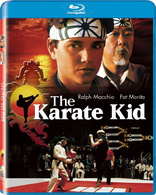
Movie rating
7.8 | / 10 |
Blu-ray rating
| Users | 4.3 | |
| Reviewer | 4.0 | |
| Overall | 4.2 |
Overview
The Karate Kid (1984)
Daniel LaRusso arrives in Los Angeles from the east coast and faces the difficult task of making new friends. However, he becomes the object of bullying by Cobra Kai, a menacing gang of karate students, when he strikes up a relationship with Ali, the Cobra Kai leader's ex-girlfriend. Eager to fight back and impress his new girlfriend but afraid to confront the dangerous gang, Daniel asks his handyman Mr. Miyagi, whom he learns is a master of the martial arts, to teach him karate. Mr. Miyagi teaches Daniel that karate is a mastery over the self, mind, and body and that fighting is always the last answer to a problem. Under Mr. Miyagi's guidance, Daniel develops not only physical skills but also the faith and self-confidence to compete despite tremendous odds.
Starring: Ralph Macchio, Pat Morita, Elisabeth Shue, Martin Kove, Randee HellerDirector: John G. Avildsen
| Family | Uncertain |
| Sport | Uncertain |
| Action | Uncertain |
| Martial arts | Uncertain |
| Drama | Uncertain |
Specifications
Video
Video codec: MPEG-4 AVC
Video resolution: 1080p
Aspect ratio: 1.85:1
Original aspect ratio: 1.85:1
Audio
English: DTS-HD Master Audio 5.1 (48kHz, 24-bit)
French: DTS-HD Master Audio 5.1 (48kHz, 16-bit)
Portuguese: DTS-HD Master Audio 5.1 (48 kHz, 16-bit)
Spanish: Dolby Digital 5.1
Subtitles
English, English SDH, French, Portuguese, Spanish
Discs
50GB Blu-ray Disc
Single disc (1 BD)
BD-Live
Playback
Region free
Review
Rating summary
| Movie | 5.0 | |
| Video | 4.0 | |
| Audio | 3.5 | |
| Extras | 3.5 | |
| Overall | 4.0 |
The Karate Kid Blu-ray Movie Review
You're the best around.
Reviewed by Martin Liebman April 29, 2010Not everything is as seem.
Combining two of the more prominent genres of the 1980s -- the coming-of-age teenage Drama
and the feel-good, inspirational, come-from-behind underdog story -- The Karate Kid has
become nothing short of a cinematic icon, and it's still as fun, moving, and meaningful now a
quarter-century after its release as it was back in 1984. It's one of a handful of pictures -- along
with movies like Dirty Dancing and
The Breakfast Club
-- that are not only readily associated with the decade but represent
much of what it stood for in terms of cinematic style and theme. What these movies, and
The Karate Kid in particular, lacked in suspense or originality, they more than made up
for in heart and spirit. While several elements of the Karate Kid -- "wax on, wax off;"
"sweep the
leg;" and bonsai trees -- have morphed into something akin to running gags, they're still as much
a cultural sensation now as they were back in the day, and the movie as a whole still works in
large part because there's so much
meaning, so many truisms,
so many life lessons tucked neatly behind the picture's admittedly clichéd and predictable story
line. Capturing the spirit of friendship, the importance of integrity, the value of hard work, and
the understanding that the effort is often worth more than the win, The Karate Kid
proves one of the more thematically relevant and emotionally satisfying movies of all time.
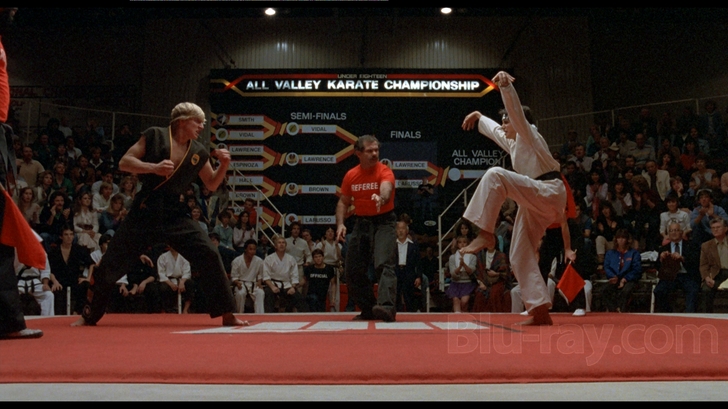
Float like a butterfly, sting like a crane kick.
Young Daniel Larusso (Ralph Macchio, My Cousin Vinny) and his mother Lucille (Randee Heller) are moving to Reseda, California, from Newark, New Jersey. Mom's excited for the move and her new job, but Daniel soon finds himself struggling to get along in his new environment. Though he meets and instantly connects with the beautiful Ali (Elisabeth Shue, (Hollow Man), he finds himself at odds with her ex-boyfriend, the cocky karate student Johnny Lawrence (William Zabka). Pushed to his limit, Daniel resigns himself to a life of misery in California, until he befriends his apartment complex's maintenance man, the elderly Okinawan Mr. Miyagi (Pat Morita). When Mr. Miyagi rescues Daniel from a brutal five-on-one beating and witnesses firsthand the demeaning and dangerous teachings of Johnny's dojo instructor John Kreese (Martin Kove), he agrees to teach Daniel the art of karate so he may defend his honor and stand up to Johnny and his Cobra Kai bullies at the local All-Valley Karate Tournament. Unfortunately, Daniel's far behind the Cobra Kai students, and with only two months to catch up, he undergoes intense physical training -- that at first seems to have no relevance to karate -- under the auspices of his unassuming sensei. As the tournament draws near and Daniel's skills improve, he continues to build his budding relationship with Ali while weaving a close-knit relationship with his gently powerful master.
Obviously, there's quite a bit that's made The Karate Kid a standout movie and one of the shining examples of 1980s filmmaking, but perhaps a bit lost underneath the feel-good storyline, raw emotion, 80s soundtrack, and memorable quotes is the picture's very deep and potent wisdom that held true in 1984 and continues to prove relevant in 2010. There's a surprising amount of depth to the characters despite the picture's superficial one-dimensional tone that gives the illusion of a movie that's little more than a one-trick pony that follows several months in the life of a young man as he comes of age in a new environment and learns to stand up for himself under the guidance of an older and wiser mentor. Indeed, there's much more to it than it; this is a smart, purposeful movie that conveys several crucial life lessons through what is really a cut-and-dry, black-and-white, good-versus-bad movie, but the deeper elements transcend such simplicities and can and will apply to most any area of one's life. Principles such as trust, honesty, friendship, self-confidence, and the importance of striving to be one's best are explored throughout the movie, usually beneath the surface but nevertheless deeply and relevantly weaved into the plot. It's a sign of a strong motion picture where the themes are obvious to the viewer but not overwhelming to the experience as they work their way into the story and ultimately prove far more in-depth and pertinent to the world outside the film should viewers choose to examine what it is the movie says and does beyond the superficial elements that appear on-screen.
Of course, it's the Miyagi character that comes between the clear-cut "good" and "bad" elements and gives shape and structure to the themes of the film beyond the superficialities that dominate the movie. It's no coincidence that Miyagi is depicted as a maintenance man, a "fixer upper" who can give new life to broken objects, but even more relevant to the story is his attention to detail and ability to so finely trim his bonsai trees. It demonstrates his patience with a shapeless object as he morphs it into something better, something that's unique, and as he tells Daniel to close his eyes, imagine the shape of the tree, and proceed to trim it to reflect the vision, he's saying that anything's possible; Daniel or, indeed, anyone watching the movie need only envision what it is they want to do and do it. As with trimming the tree, it's an exercise in patience and precision, but the vision that's the driving force behind the shaping of the tree is the first of many lessons the sensei teaches his student and, by extension, the audience throughout the picture. The late Pat Morita's effort throughout the movie is positively stunning. One of the most natural performances ever, his is as endearing, lovable, and memorable as just about any other in film history. There's so much more than "wax on, wax off," "sand the floor," "paint the fence," and all the other quips for which he's known; his words may be few but he shows such a wide berth of knowledge through them, in part because they're, like the movie, deeply significant but also because Morita plays the part with an honesty and integrity that, like good karate, comes from the heart and soul. His is a selfless character and he delivers an equally selfless performance; Miyagi is a truly inspirational character not only for the wisdom he shares but through his personal history of overcoming tragedy that's touched upon in the film. As a father figure to Daniel, he lends more weight to the story by conveying a true sense of family, kinship, and belief in overcoming any obstacle, ultimately proving to be one of cinema's finest characters.
From a technical perspective, The Karate Kid also excels. Granted, the picture may be a bit slow out of the gate, but the pacing and a runtime that creeps over two hours allows Director John G. Avildsen (Rocky) to more deeply develop his characters, giving the story a major boost, even if it's little more than window dressing against what is a rather transparent run to the movie's finale. As noted earlier, though, The Karate Kid is more about its people and what they learn than it is the A-to-B-to-C plot run through, and the solid characterization only reinforces the meanings behind the movie. Though Morita steals the show, The Karate Kid also boasts some wonderful additional performances. Ralph Macchio never did much in his career outside of the trio of Karate Kid films and My Cousin Vinny, but he's got this role down pat, showing an understanding of the character and the material almost too well, and while his acting can be a bit shaky at times, he more than makes up for it with some genuinely heartfelt scenes opposite Morita, not to mention a sweet little romance with a well-cast Elisabeth Shue. Otherwise, The Karate Kid just oozes 80s; the typical underdog story sees the villains as true punks with no class or honor while its hero is a scrawny nobody, oddly contrasting with big 80s Action movies where the hero never seemed to be large enough (think Arnold in Commando). The music is just about as hip and happening as any other big-name decade flick, with Joe Esposito's "You're the Best Around" still a rousing montage pace-setter that supports the movie wonderfully and remains one of the quintessential 80s anthems.
The Karate Kid Blu-ray Movie, Video Quality 
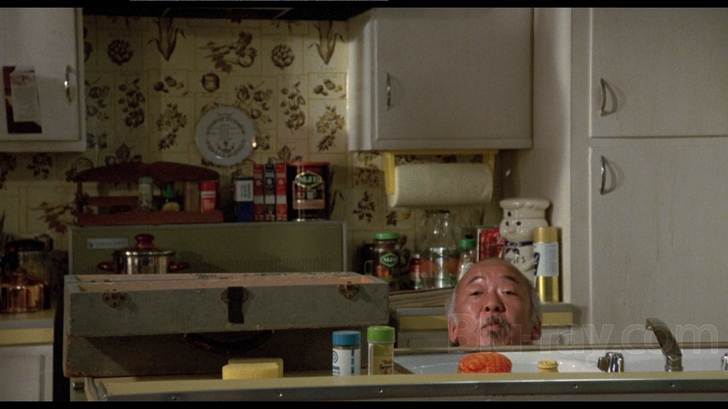
Sony has done a marvelous job with this Blu-ray release of The Karate Kid. Retaining its original 1.85:1 framing and boasting a 1080p high definition picture quality, this is now the absolute finest the movie has ever looked for home viewing, and by a wide margin at that. It's certainly not The Young Victoria or Legion, two practically flawless and pristine fresh-from-theaters transfers from Sony, but The Karate Kid isn't meant to look that way, nor should it. It's a bit rough around the edges and noticeably grainy, but it reflects the picture's natural state, which is always what Blu-ray should strive for and Sony always seems to accomplish with their releases of both new and older films. Though there's some evident telecine wobble accompanying the opening titles, a slight bit of blocking and banding here and there, and several shots that appear noticeably softer and smudgier than others (coming mostly in medium- to long-distance establishing shots), this is otherwise a consistent and wonderfully crisp, handsome, an stable transfer of a film that's more than a quarter-century in age. Details are nicely rendered throughout; heavy sweaters, dents and scratches on school lockers, stitching in karate uniforms, and other objects throughout the picture enjoy boosted texturing and clarity thanks to the 1080p resolution. Colors -- notably some reds -- stick out as a bit unnaturally over-saturated, but flesh tones generally retain a neutral shade and blacks are consistently deep and dark, exhibiting only slight crush here and there. As noted above, The Karate Kid retains a rather heavy layer of grain; it gives the picture that somewhat rough feel employed by so many 80s movies, but the print is otherwise free of obtrusive speckles or debris. Simply put, The Karate Kid looks fantastic on Blu-ray; its few flaws and dated look are forgiven considering that this is the best the picture has ever looked in the home and it seems to stay true to the original, intended presentation.
The Karate Kid Blu-ray Movie, Audio Quality 
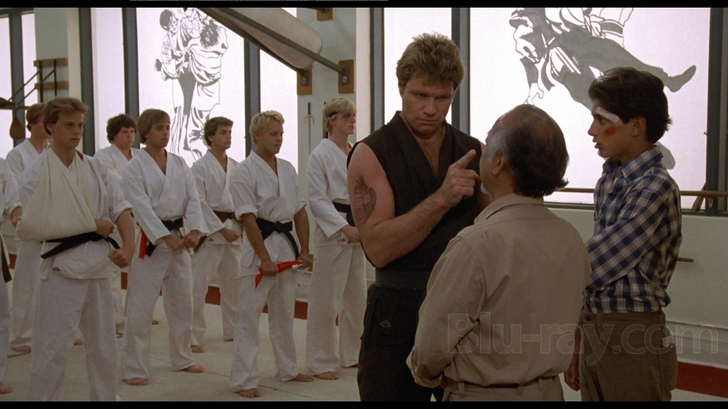
Much like The Karate Kid's video transfer, its DTS-HD MA 5.1 lossless soundtrack isn't the pristine and seamless experience that so often accompanies pictures of a fresher vintage, but it suits the movie just fine nevertheless. The music throughout the film sounds too sharp at times, but it's generally crisp and clear, with a nice spread across the front part of the soundstage and a slight rear-channel support structure. The 80s songs -- "You're the Best" and "Cruel Summer" for instance -- in particular benefit from the lossless encode, sounding more refined and significantly smoother than on previous home video renditions. The rear speakers enjoy limited action, coming alive primarily for what is somewhat jumbled but ultimately effective support, whether in a bustling cafeteria scene in chapter three that nicely reproduces a chatty background din or the intense cheering of the crowd during the tournament scenes at the end of the movie. Directional effects are solid when called upon; bikes zip across the soundstage in a couple of scenes with a mostly seamless sense of space as the sound traverses the speakers. Unfortunately, dialogue can come across as somewhat mushy at times, but generally, there are no problems with clarity or discernment. Though not an engaging, full-fledged sonic extravaganza, The Karate Kid sounds great in context; it's not perfect, but considering the elements and the film's age, Sony has done yet another remarkable job with this fan-favorite and deserving catalogue release.
The Karate Kid Blu-ray Movie, Special Features and Extras 
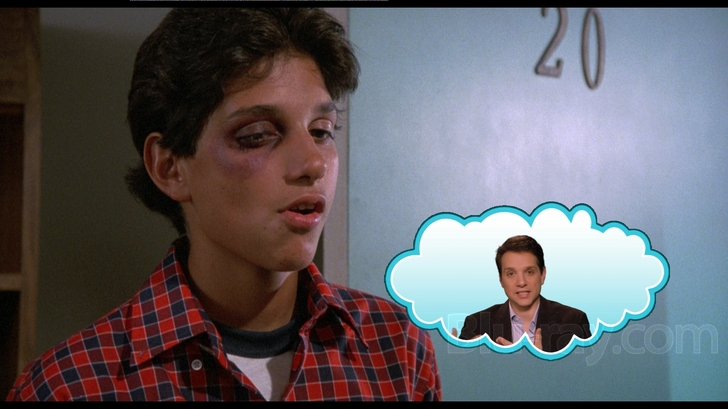
The Karate Kid contains a nice allotment of extra features. Blu-Pop, a new
feature from Sony debuting on both this disc and the accompanying release of The Karate Kid, Part
II, would seem to be just a fancy name for a pop-up, graphically-based trivia track, but
it also offers video interview clips with Actors Ralph Macchio and William Zabka. The actors make
this into a de facto mini video commentary track by injecting plenty of information into their
many
snippets. Users can skip directly to the text and video bubbles by pressing the "chapter skip"
button on the remote control. Also included is a traditional audio commentary track with Director
John G.
Avildsen, Writer Robert Mark Kamen, and Actors Pat Marita and Ralph Macchio. This is a fairly
jovial track; participants often speak on top of one another and intertwine technical talk with
more relaxed off-the-cuff material thrown in for good measure. There's a wide swath of info
discussed here; the Blu-Pop segments are more focused, but this proves a worthwhile track, too.
The Way of the Karate Kid: Part 1 (480i, 24:00) is a capable, interesting documentary
that features cast and crew speaking on the origins of the picture, the casting process and the
chemistry between the leads, shooting in the Valley, the elements of the plot, character traits,
the quality of the screenplay, the themes of the story, and the legacy of some of the memorable
lines from the film. The Way of the Karate Kid: Part 2 (480i, 21:25) continues on with
the same format as Part 1, this one examining the work of Director John G. Avildsen,
Morita's "drunken scene" and its effect on the feel of the picture, the movie's legacy, recollections
from the set and the bond between actors, shooting the karate tournament segment, the fight
choreography and the cast's training in karate, the crane kick finale, and the picture's thematic
purpose and lasting legacy. Next up is Beyond the Form (480i, 13:03), a piece that
looks at the
cast's training sessions for the film, the importance of physical and spiritual balance to the art of
karate, and the picture's impact on karate around the world, all with Martial Arts Master and
Choreographer Pat E. Johnson. East Meets West: A Composer's Notebook (480i, 8:17)
features Composer Bill Conti speaking on the many elements that comprise his music for the film
and the thought processes that allow him to choose the right music for every part of the movie.
Life of Bonsai (480i, 10:00) features Bonsai Master Ben Oki discussing the famed tree
that plays a prominent role in the film. Also included is BD-Live functionality and 1080p trailers
for Hachi: A Dog's Tale,
Extraordinary
Measures, Facing the Giants,
and The Water Horse: Legend of
the Deep.
The Karate Kid Blu-ray Movie, Overall Score and Recommendation 
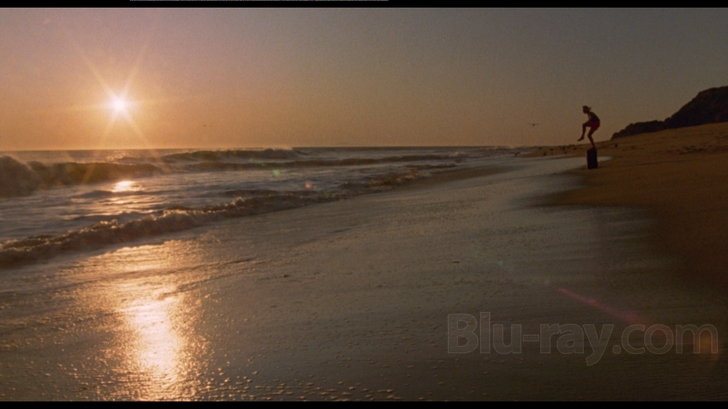
The Karate Kid might not be a perfect movie in the traditional sense; it's certainly not The Godfather, but it's an exceptional picture in its own right and in the realm in which it operates. It's up there with the very best underdog/inspirational movies of all time, and the picture's finely-tuned script that's far deeper than the shallow, cliché-ridden, and utterly predictable material that superficially plays out through the 120-some minute runtime would seem to let on works in large part thanks to Pat Morita's Oscar-nominated performance which is, quite simply, one of the most seamless and, arguably, perfect performances ever to grace the screen. Like any good 80s movie worth its salt, The Karate Kid is also infinitely quotable, holds a high replay value, sports a wonderfully dated but still toe-tapping good-time of a soundtrack, and delivers a not-so-subtle series of life truisms underneath the the karate lessons and character traits. Nostalgic yes but still holding up today in every facet, The Karate Kid is classic cinema and a perfect glimpse into what a large chunk of 80s filmmaking was all about. Sony's done this gem in their catalogue proud; the technical presentation doesn't look or sound like a sparkling new release, but it's not supposed to. As it should be, it's a rather drastic upgrade from pervious releases and is probably the closest to the original look and sound that The Karate Kid is going to enjoy for some time. A high quality supplemental section rounds out a must-own package. The Karate Kid comes very highly recommended.
Other editions
The Karate Kid: Other Editions

The Karate Kid
1984

The Karate Kid 4K
35th Anniversary Edition
1984

The Karate Kid 4K
Karate Kid Collection Version
1984

The Karate Kid 4K
VHS Collectible Packaging
1984
Similar titles
Similar titles you might also like

The Karate Kid II
1986

The Karate Kid: Part III
Choice Collection
1989

The Next Karate Kid
Choice Collection
1994

The Karate Kid
2010

McFarland, USA
2015

Facing the Giants
2006

Invincible
2006

Radio
2003

Woodlawn
2015

My Dog Skip
2000

Never Back Down
2008

Miracle
2004

Dreamer
2005

Goal! The Dream Begins
2005

Cobra Kai: Season One
2018

The Rookie
2002

Greater
2016

The Perfect Game
2009

Secretariat
2010

Home Run
2013